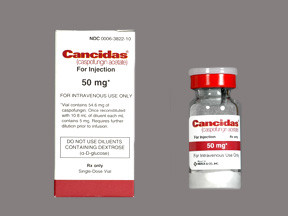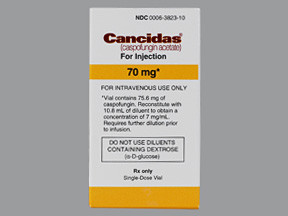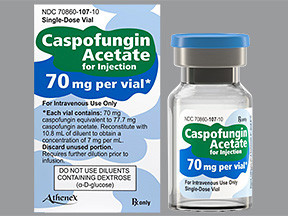CASPOFUNGIN - INJECTION
PHONETIC PRONUNCIATION: (KAS-poe-FUN-jin)
COMMON BRAND NAME(S): Cancidas
GENERIC NAME(S): caspofungin acetate
Uses
USES: Caspofungin is used to treat a variety of fungal infections. Caspofungin belongs to a class of drugs known as echinocandins. It works by stopping the growth of fungi.
How to use CASPOFUNGIN - INJECTION
HOW TO USE: This medication is given by injection into a vein as directed by your doctor, usually once a day over 1 hour. The dosage and length of treatment are based on your medical condition, response to treatment, and other medications you may be taking. Be sure to tell your doctor and pharmacist about all the products you use (including prescription drugs, nonprescription drugs, and herbal products). In children, the dosage is also based on their body size. If you are using this medication at home, learn all preparation and usage instructions from your health care professional. Before using, check this product visually for particles or discoloration. If either is present, do not use the liquid. Learn how to store and discard medical supplies safely. Infusion reactions may happen while you are receiving the drug. Tell your doctor right away if you have symptoms such as fever, chills, shortness of breath, flushing, or dizziness. Continue to use this medication until the full prescribed amount is finished, even if symptoms disappear after a few days. Stopping the medication too early may result in a return of the infection. Tell your doctor if your condition does not get better or if it gets worse.
Side Effects
Precautions
Interactions
Overdose
Images
Reviews
Faq for CASPOFUNGIN - INJECTION
Caspofungin injection is used to treat certain fungal infections, including esophageal candidiasis and invasive aspergillosis.
Caspofungin works by inhibiting the synthesis of fungal cell walls, leading to the destruction of the fungal cell and ultimately killing the fungus.
Caspofungin is given by intravenous infusion. It is usually administered once daily and the dosage may vary depending on the specific infection being treated.
Common side effects of Caspofungin injection include fever, nausea, diarrhea, headache, rash, and elevated liver enzymes. It is important to consult a healthcare professional if any severe or persistent side effects occur.
Caspofungin may interact with certain medications, such as cyclosporine, sirolimus, and certain anticoagulants. It is important to inform your doctor about all the medications you are taking to avoid potential interactions.
The duration of Caspofungin treatment depends on the specific fungal infection being treated. It can range from a few weeks to several months. Follow the prescribed treatment regimen recommended by your doctor.
Caspofungin should only be used during pregnancy or breastfeeding if the benefits outweigh the potential risks. It is important to discuss the potential risks and benefits with your healthcare provider before using this medication.
Caspofungin injection is approved for use in children, but the dosage and duration of treatment may vary based on the child's age, weight, and overall health. Consult a healthcare professional for appropriate pediatric dosing.
If you miss a dose, contact your healthcare provider to determine the next appropriate steps. It is important not to double the dose to make up for a missed dose.
Disclaimer
IMPORTANT: HOW TO USE THIS INFORMATION: This is a summary and does NOT have all possible information about this product. This information does not assure that this product is safe, effective, or appropriate for you. This information is not individual medical advice and does not substitute for the advice of your health care professional. Always ask your health care professional for complete information about this product and your specific health needs.




No Reviews Yet